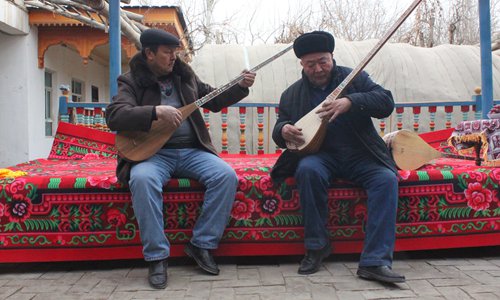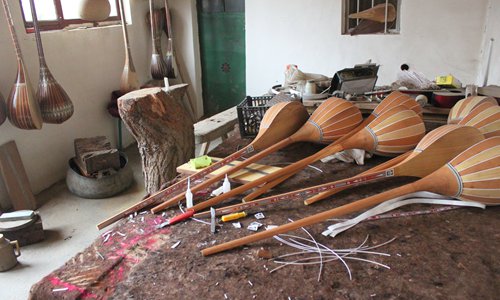
From the People's Daily app.
And this is Story in the Story.
Making and selling traditional musical instruments of ethnic groups has become part of the burgeoning tourism industry in Xinhe county in Aksu Prefecture, Northwest China's Xinjiang Uyghur Autonomous Region.
Back in 2014, the county government approved the establishment of an incubation base for developing businesses related to traditional musical instruments for ethnic groups, offering free training and preferential policies to local residents who make instruments and work in the tourism industry.
As many cultures in Xinhe county have been identified as intangible heritages, including the craft of making traditional musical instruments, the county government has put forward policies on developing and preserving this heritage. For example, it encourages skilled craftsman to train apprentices, giving them 150,000 yuan in financial support every year.
Other measures include sending apprentices who perform particularly well to study in art academies in Xinjiang, according to the Xinhe government.
Today's Story in the Story looks at the example of one Xinjiang instrument maker who is dedicated to passing on his skills to the next generation.

Aiyiti (right) plays one of his musical instruments with his apprentice in Aiyiti's house. (Photo: GT)
Every time Aiyiti Yiming plays his hand made Dutar, his youngest daughter dances along to the music. It's a scene that always backs memories of Aiyiti playing the instrument with his departed father.
"I learned how to make these musical instruments from my father when I was 15 years old, and he learned the skills from my grandfather. I earn a living from making these instruments, and I love the music," Aiyiti said.
Aiyiti was born in 1954 in Jiayi village in Xinhe county.
"Jiayi" means "residents living along the road" in Uyghur, as all the houses in this village were built along the main road. One village tale tells of a musician called Shayifu Banlihe. Hundreds of birds would fly around him when he played his instrument, and passers-by would also be mesmerized by his music.
There are more than 106 households in the village that make musical instruments of ethnic groups, including the Dutar, Surnay, Qushtar, Tambur, Rawab and Dombra.
Because of his skill, Aiyiti stood out among them. He was named an inheritor of an intangible cultural heritage for making musical instruments of ethnic groups in Xinjiang in 2008 and has trained more than 80 apprentices in Xinhe county.
Visitors to Aiyiti's house can see two rooms that have been converted into workshops, one for making musical instruments and one for displaying the completed ones. In one workshop, there are piles of wood and half-finished instrument parts, some resembling a large spoon.
Aiyiti pointed to one of the spoon-like pieces of wood and explained, "This is the Dutar, which is made of mulberry wood. We need to use a special chisel to make the wood into an oval-like shape on one side and make the other side hollow."

Half-completed Dutars in Aiyiti's workshop. (Photo: GT)
The other parts of the Dutar include crooked wooden chips that cover the outside of the oval-like body, a long "handle" for the strings, and ornamental decorations for the musical instrument.
"It takes dozens of days to complete a Dutar. Take the one which I sell for 30,000 yuan ($4,472), for example. The ornaments on it were made of high-quality ram's horn and snakeskin. It takes a year to finish making three such Dutar," Aiyiti said.
"The strings of the Dutar were made of ram's intestines. I bought intestines and put them into salty water for about three days. And then by using a stick with two holes on each side, I stretched them again and again to make it as thin and soft as it needed to be," he said.
Thanks to industrial advances, there is now no need to go to such lengths to produce strings. Aiyiti said he can now buy different strings he needs from markets that guarantee their quality.
But he insists on making the other parts of different instruments by hand and asks all his apprentices to do the same. "Making musical instruments is a craft that needs to be carried forward to the next generation," he said.
Many households in Jiayi village are considered poverty-stricken. Aiyiti now has more than 10 apprentices learning how to make instruments with him in his workshops. Many of them are from poverty-stricken families.
The income from his workshops is about 30,000 yuan a month, and his son has opened a shop in Xinhe county selling handmade instruments.
Aihmeti Rouzi is one of Aiyiti's apprentices. "My family has no land. But now I am supporting my four-member family by making musical instruments," he said.
For many families in Jiayi village, making musical instruments has become a way out of poverty.
(Produced by Nancy Yan Xu, Brian Lowe, Lance Crayon and Da Hang. Music by: bensound.com. Text from Global Times.)


